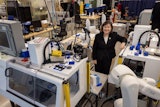TRAVERSE CITY, Mich. (AP) — At its first meeting, the board overseeing the new General Motors Co. ordered management to bring some new vehicles to market faster, a sign that the new 13-member board will play a far larger role than the old one.
Board Chairman Edward Whitacre Jr., in a conference call with reporters Wednesday, would not identify which vehicles were pulled ahead, but said the board of the government-controlled company emphasized fuel efficiency as well as other areas.
"I'll tell you there were some suggestions made," said Whitacre, former CEO of telecommunications giant AT&T. "There were some changes made. This board's going to be very active. We're charged with doing well for the stockholders."
GM, which emerged from bankruptcy protection July 10, can become profitable sooner than most people think, Whitacre said, although he wouldn't give a time frame. The company is not yet profitable despite shedding debts and burdensome contracts in bankruptcy court, he said.
"We've only been at this one month," he said. "It's a complicated financial situation at this point in time. We have an aim for when we'll cross that line."
The board, he said, spent much of its time going over GM's financial statements, then moved to the Milford, Mich., proving ground northwest of Detroit to drive vehicles.
After the drives, Whitacre said he is confident that GM can protect and grow its market share in the U.S. despite shedding four brands to focus on Chevrolet, Buick, GMC and Cadillac.
GM ended July with 18.9 percent of the U.S. market, down from 20.5 percent a year ago. The company in the 1950s controlled more than 50 percent of the market.
GM, in a viability plan filed with the U.S. government in April, predicted its U.S. market share would be 19.5 percent this year, 18.9 percent next year and 18.6 percent in 2011.
Whitacre said he is confident the company can maintain those numbers and even grow, despite selling or scrapping Pontiac, Saturn, Hummer and Saab.
"We think it's possible. Time will tell," he said, adding that it's important to grow market share to grow sales.
GM will stick with the Chevrolet Volt rechargeable electric car despite reservations about its prospects of making money that were expressed by members of the Obama administration's auto task force, Whitacre said.
The Volt, due in showrooms late next year, can go 40 miles on a single charge from a home electrical outlet. It has a small internal combustion engine on board to generate electricity for the car beyond that.
He called the Volt a "leap in technology" that no one else has, and said the country needs to move toward electric vehicles.
"I think it will be very successful," he said.
Whitacre said the board was interested in pulling more fuel-efficient products forward.
"We're certainly going that direction of more efficient models," he said. "We're looking at reliability. We're looking at efficiency. We certainly will make a major thrust in that direction, but that's not the only direction we're going."
Many critics say GM's old board, once called a "pet rock" by former member H. Ross Perot, stuck with former Chairman and CEO Rick Wagoner too long and failed to make management changes over the years.
New CEO Fritz Henderson already has ushered several top managers into retirement and moved up younger people, although he has been unable to bring in outsiders.
Yet Whitacre said moving up people from within the company will help it make decisions faster, and he said he wasn't sure that the culture needed to be changed as much as the structure changed so people can show their talents.
"I think there's a lot of talented people at General Motors," he said. "The people that I've encountered certainly are capable and they're enthusiastic."
He said the board of the company, which now is 61 percent owned by the U.S. government, will not be involved in day-to-day operations, leaving that to Henderson. The board, he said, supports Henderson and the top management.
"He certainly has our blessings and encouragement," Whitacre said. "He knows what the board expects from him."
Whitacre said he talks with Henderson almost daily.
The board's more activist stance is a positive sign for the company and shows the board is interested in turning a profit quickly so GM can sell stock to the public once again, said Robert Wiseman, a professor of strategic management at the Eli Broad College of Business at Michigan State University.
The U.S. government, which has given GM $50 billion in aid, is hoping to get much of its money back through a public stock offering as early as next year.
By pulling some products into showrooms earlier, the board also is showing that GM has a stream of new vehicles coming, he said.
"The price of the stock is determined by what's going to happen next," he said.
He said the board's involvement in product decisions seems to show that the new board intends to be more active than the previous one.
Whitacre would not comment on GM's negotiations with two bidders to sell part of its European Adam Opel GbmH operations other than to say he expects to resolve the situation soon.
The two potential suitors for Opel and the British Vauxhall unit are a consortium of Canadian car parts maker Magna International Inc. and Russian lender Sberbank; and Brussels-based investor RHJ International SA. GM has a tentative deal with the Magna group but has continued talks with RHJ.
The company said Opel's cash situation is stable because of improving sales, but it could see difficulty late in the fourth quarter.
Whitacre said he is encouraged by GM's products. The company now must improve in selling and marketing them, he said.



















